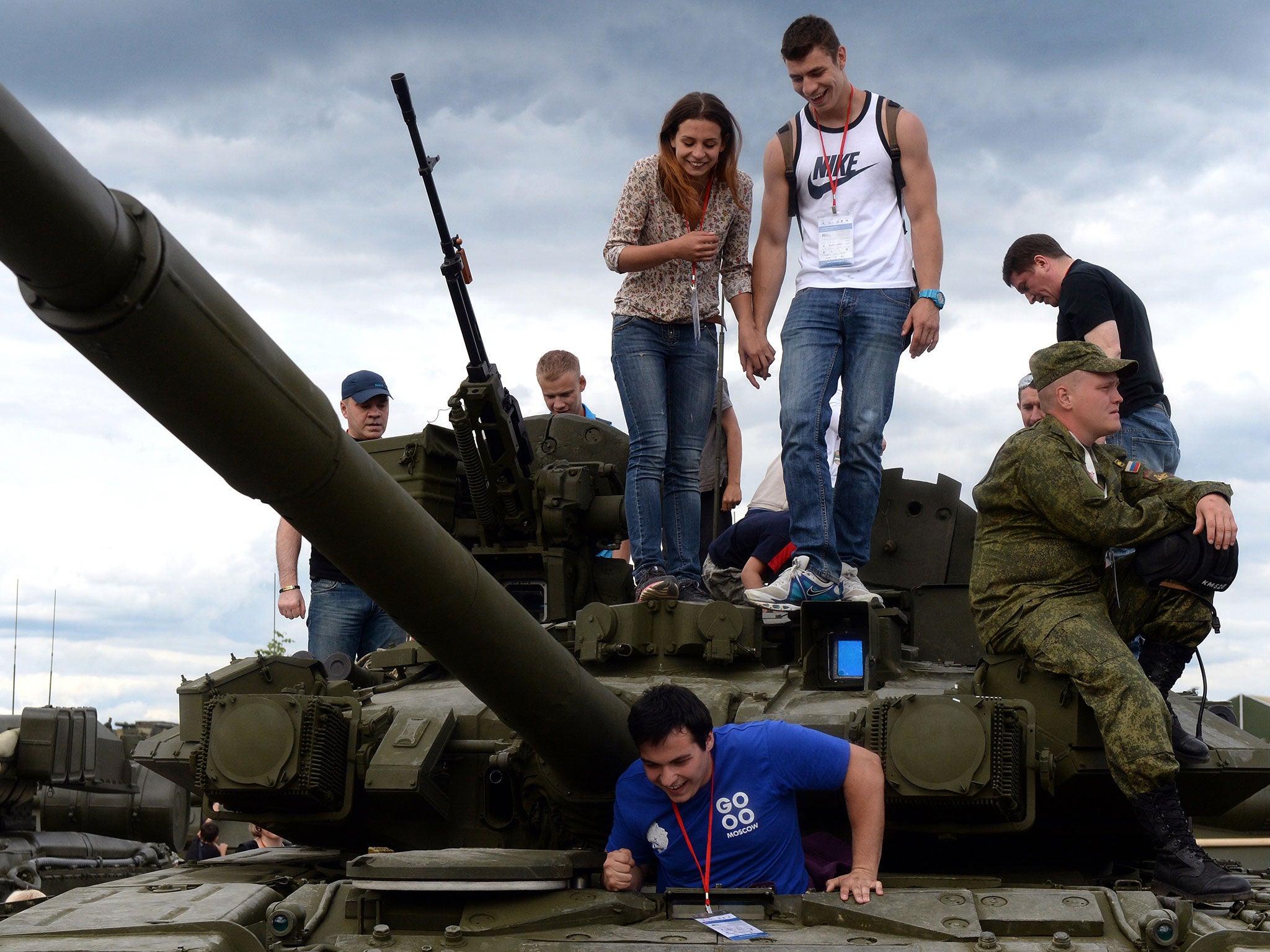Russia’s military renaissance attempts to bring the army into the heart of society
Revamp following the events in Crimea, eastern Ukraine, and Syria, aims to make it the place where non-violent criminals can get their 're-education'

Soon after Russia began its military airstrikes in Syria, the manikins in the window of the “Army of Russia” clothes store in Moscow donned T-shirts with the words “Support Assad” emblazoned across the front.
Usually stocked with clothes, bags and iPhone covers bearing the Army of Russia logo, the shop, which opened after the annexation of Crimea, has been inspired by President Vladimir Putin’s recent venture in the Middle East. Such sights are not out of place now in Russia.
Following the events in Crimea, eastern Ukraine, and now Syria, the Russian army has seen a renaissance at home. While military actions in Syria appeared to have elicited a concession that Mr Assad may be agreeable to elections, Mr Putin’s army, which has no boots on the ground if the Kremlin is to be believed, is now described as the “pivot point of Russian ideology”.
So much so, that a recent bill proposed at the Russian parliament would see Russia’s revamped military become the place where non-violent criminals can get their “re-education”. According to Alexey Didenko, a politician for the right-wing Liberal Democratic Party of Russia and the architect of the new bill, first-time criminals and perpetrators of minor crimes should be sent to the army, touted as “even more effective an educational institution than prison”.
“It’s a known fact the army helps people,” Mr Didenko told The Independent. “That’s already been established. For any man, including ones who have committed crimes, the army will help him change his worldview for the better, make him more normal.”
Such proposals barely elicit a word of surprise with Mr Putin’s State Duma increasingly the playground for outlandish bills inspired by popular trends. Although Mr Didenko’s bill, like many others proposed in the state duma, may ultimately fail to pass the three parliamentary readings needed to become law, his proposition is the product of a push from the very top of the Russian leadership to normalise the army and bring it into the heart of Russian society.
Sergei Medvedev, a professor at Moscow’s Higher School of Economics, said: “[The government] has managed to link any policy of Russia, from domestic policy to the war in Ukraine and eventually almost to Syria, to the idea of some global threat against us.”
He added: “The orange and black St George’s ribbon [which became a patriotic symbol in Russia after the annexation of Crimea] is now the symbol of a new Russia. The image of the Kalashnikov gun can be seen stuck onto car windows.”
The militaristic fervour is not limited to politics. In a town to the west of Moscow, Mr Putin has opened “Patriotic Park”, a military theme park where children can play on tanks, hold guns and watch military drills, while those old enough can enlist for the army in recruitment booths. The park “is an important element in our system of military-patriotic work with young people”, Mr Putin told the crowds at the opening in June. A year before, a summer camp debuted in Nizhny Novgorod, where children between the ages of 12 and 18 were taught basic military skills and took lessons in how to “love their country”.
The re-invention of the Russian army into a popular, family-friendly institution took off after Crimea was annexed and the war in Ukraine began. As Russia’s jingoistic state media painted the Maidan protests that led to the removal of the pro-Russian president Viktor Yanukovych as a US-backed coup, the army became a force to shield Russia from western foes – bolstering Russian patriotism in the process.
Fifty years ago the streets of Leningrad taught me if a fight is inevitable, you have to hit first
With Syria on the brink of becoming a proxy war between Russia and the West, this narrative has continued. After Russian forces began airstrikes in Syria, aerial video footage showing the destruction of Damascus was released by Russia’s Ministry of Defence. The slick films, with action-style soundtracks, shocked even Kremlin critics, and was described by one as a clear appeal “to the ‘gamefied’, computer generation [in Russia]”.
If Russian and Syrian state media outlets were to be believed, the Russian assault in Syria appears to be having the desired effect. Mr Assad was reported to have met a delegation of Russian politicians and conceded that, after the “elimination of terrorist groups”, there could be elections in Syria. Asked after the meeting if Mr Assad was ready for early elections, Russian parliamentary deputy Sergey Gavrilov said he was “ready for broad dialogue with all responsible political forces that care about Syria. He is ready for parliamentary elections, constitutional reform, presidential elections if necessary”.
Amid Russia’s increasing international isolation, the Kremlin has increased the activity of the Russian military at home as well as abroad. Since first voicing plans to beef up Russia’s military outposts in the Arctic regions in 2008, defence minister Sergei Shoigu announced three new military bases in the Arctic and one on the Kuril Islands near Japan are under development, sending a strong message that the Kremlin is ready to defend even its remotest points.
“Fifty years ago”, Mr Putin said at a conference in Sochi on Thursday after meeting Mr Assad, “the streets of Leningrad taught me if a fight is inevitable, you have to hit first”.
Subscribe to Independent Premium to bookmark this article
Want to bookmark your favourite articles and stories to read or reference later? Start your Independent Premium subscription today.

Join our commenting forum
Join thought-provoking conversations, follow other Independent readers and see their replies